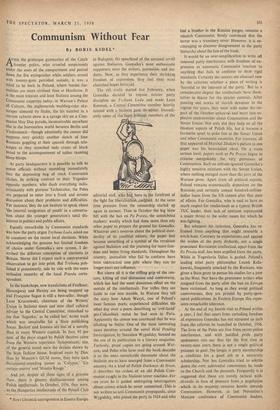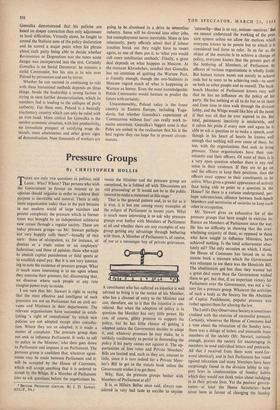Communism Without Fear
By BORIS KIDEL* /Fret the grotesque gymnastics of the Czech frontier police, who crawled suspiciously under the seats of the compartment and peered down the fire extinguisher while soldiers armed with tommy-guns patrolled outside, it was a relief to be back in Poland, where border for- malities are more civilised than at Heathrow. It is the most tolerant and least Stalinist among the Communist countries today; in Warsaw's Palace of Culture, the nightmarish • wedding-cake sky- scraper donated by Stalin, the hit number in a current cabaret show is a savage skit on a Com- munist May Day parade, inconceivable anywhere ,else in the humourless world between Berlin and Vladivostock—though admittedly the censor did ' 'suppress very quickly another sketch of four 'Russians goggling at their sputnik through tele- scopes as they munched stale crusts of black bread to the accompaniment of rather taunting bleep-bleeps.
At party headquarters it is possible to talk to senior officials without stumbling immediately into the depressing bog of stock Communist clichés. ,In striking contrast to their Yugoslav Opposite numbers, who daub everything indis- criminately with glorious Technicolor, the Poles are prepared to enter into a frank and serious discussion about. their problems and. difficulties. For instance,.they do not hesitate to speak about `the internal 'emigration of youth' in a conversa- tion about the younger generation's total' dis- interest in politics and public affairs.
Equally remarkable by Communist standards svas•how the party organ Trybuna Ludu asked me to comment on the recent local elections. While acknowledging the genuine but limited freedom of choice under •Gomulka's new system, I de- scribed the different conception of elections in Britain. Never did I expect such a controversial observation to get into print. But Trybuna pub- lished it prominently, side by side with the•more orthodox remarks of the local Pravda corre- spondent.
In' the bookshops, new translations of Faulkner, Hemingway and Huxley are being snapped up and Francbise Sagan is still a best-seller, though Leon KruczoWski, chairman of the Writers' Union in Stalinist times and 'now chief cultural adviser, to the Central Committee, remarked'' to Me that `Saganka,' as he called her:Wrote trash which was unsuitable for a ' State publishing house. Beckett and Ionesco ace lesi'of a novelty than in many Western capitals. In' fact,` 91 per cent. of the plays staged by Polkh theatres come from the Western repertoire.. SYMptornatie, too, of the gener.1 mood were the dregses shown by the State fashion house. Inspired' more by Dior than by Moscow's GUM stores, they bore 4iith deviationist-sounding names as ' 'Calypso,' 'lin certain sourire' and 'Moulin Rouge.' ' ' And yet, despite all .these signs of a, genuine thaw, there is gloomy disillusionment aiming Polish intellectuals. In .October.,. 1956, they were, .. as. the Hungarian intellectuals of the Petoefi Club * Novi Chronicle correspondent in Eastern Europe. in Budapest, the spearhead of the national revolt against Stalinism. Gomulka's most enthusiastic supporters were the writers, journalists and stu- dents. Now, 45 they experience their shrinking freedom of expression, they feel their most cherished hopes betrayed.
The rift really started last February, when Gomulka decided to impose stricter party discipline on Trybuna Ludu and made Leon Kasman, a Central Committee member heavily tainted with a Stalinist past.; its-editor. Immedi- ately some of ihe'inost...briltiartt members of the editorial stall', who had, been in the forefront of the fight for liberalisation,resigned. At the same time pressure from the censorship started up again in earnest. Then in. October the big blow fell with the ban on Po Prostu,. the uninhibited students' weekly which had done more than any other paper to prepare the ground for Gomulka. Whatever one's reserves about the political- dare devilry of its youthful editors,. the paper had become something of a symbol of the revulsion against Stalinism and the• yearning for more'free- dom and better living standards. Throughout the country, journalists who fail 'to conform have been 'sidetracked into jobs where they can no longer exert any influence. - But above all it is the stifling grip of the cen- sors, killing all 'real 'discussion and controversy, which has had the most disastrous 'effect on the morale of the intellectuals. For trifles they are liable to run into trouble. In Warsaw they tell the story how Adam Wazyk, one of Poland's most fanious poets; experienced difficulties the 'other day over a 'poem describing an 'evil-faced' pre-Columbian statue he had . seen in •Paris. Apparently the censor' was convinced that he was alluding to Stalin: One 'of the Most interesting cases revolves around the novel Held Pending lore stigatiOn, by Stanislaw Wygodzky, banned on the eve of its publication in a literary magazine. Furtively, proof copies are going. around War- saw, and Poles who have read the book, describe it as the most ,remarkable document about the Stalinist era to have emerged from a :Communist country. As a kind of Polish. Darkness At Noon, it ,describes the ordeal..of an old Polish Corn- -monist-caught in the Stalinist terror machine. For six years he is gaoled undergoing interrogation ',about: crimes 'which he never corninitted. This is not written as anti-Communist propaganda, since Wygodzky, who joined the party in 1924 and who lost a brother in the Russian purges, remains a staunch 'Communist, firmly convinced that the terror was a transitory error. However, it is en- couraging to discover disagreement in the party hierarchy about the fate of the book.
It would be an over-simplification to write off renewed party interference with freedom of ex- pression as automatic Communist reaction to anything that fails to conform to their rigid standards. Certainly the censors are obsessed now by the criterion whether a piece .of writing is `harmful to the interests of the party.' But to a considerable degree the intellectuals have them- selves to blame for the stricter controls. After pouring out works of slavish devotion to the regime for years, they went wild under the,im- pact of the Oetoberupheaval, and burst into ex- plosive controversies about Communism and the Soviet Union: Not only did they harp on all the bleakest aspects of Polish life, but it became a favourite sport to.poke fun at the Soviet Union and other Communist countries. For instance, all that appeared of Marshal Zhukov's picture in one paper was his bemedalled chest. On a more serious level, papers such as Po Prostu began to criticise °outspokenly, the . very premisses of Communism. Such an attitude ignored Gomulka's highly sensitive relations with the Soviet Union, where nothing enraged more than the jeers of the .Warsaw press. Apart from all political, aspects, .Poland remains economically dependent on the Russians and certainly annual hundred-million- dollar loans from the US cannot alter that state of affairs. For•Gomulka, who is said to have as much.respect for intellectuals as a typical British TUC leader, their. lack of restraint represented a major threat to the wider issues for which he was fighting.
But whatever his ,irritation, Gomulka has re- frained from anything that might resemble a witch-hunt. Contrary to expectations and against the wishes of the party diehards,, not. a. single prominent Revisionist intellectual, apart from the Po Prostu staff, has been expelled from the party. While in Yugoslavia Djilas is. gaoled, Poland's leading rebel party philosopher Leszek Kola- , kowski, frequently attacked by the Russians, was given a State grant to pursue his studies for a year in the West. Nor have the prominent writers who resigned from the party after the ban on Europa been victimised. As long as they avoid political controversies, they are printed by party-spon- sored publications. In Eastern.Europe,this repre- sents remarkable tolerance.
At the end of my fourth visit to. Poland within a year, I feel that apart from curtailing freedom of expression Gomulka has not retreated an inch from the reforms he launched in October, 1956. The lives of the Poles are free from secret-police interference, and with justified pride party spokesmen can,,,say that for the first• time in twenty-nine years., there is not a single political prisoner in gaol. No longer.is partymembership .a condition for. a good job, or a university scholarship.. Nor has Gomulka •tried to whittle down ,the ,very substantial. concessions he made to the Church and the peasants. Frequently it is suggested that these are merely tactical with- _drawals in face of pressure from a population .which in; its 'majority -,remains hostile towards Communism. • However, at last November's Moscow conference of Communist leaders, Gomulka demonstrated that his policies are based on deeper conviction than only adjustment to local difficulties. Virtually alone, he fought to amend the Stalinist note of the policy declaration and he scored a major point when his phrase about each party being able to decide whether Revisionism or Dogmatism was the more acute danger was incorporated into the text. Certainly Gomulka is no Social Democrat; he remains a stolid Communist, but his aim is to win over Poland by persuasion and not by terror.
Whether he can succeed in continuing to rule with these humanised methods depends on three things. Inside the leadership a strong faction is trying to stem further democratisation, which its members feel is leading to the collapse of party authority. For these men, Poland is a basically reactionary country which can only,be ruled with an iron hand. More critical for Gomulka is the sombre economic situation, with low productivity, no immediate prospect of satisfying wage de- mands, mass absenteeism and other grave signs of demoralisation. Now thousands of workers are going to be dismissed in a drive to streamline industry. Some will be directed into other jobs, but unemployment seems inevitable. •More or less reluctantly, party officials admit that if labour troubles break out they might have to resort again, as one of them put it, to 'what you would call more totalitarian methods.' Finally, a great deal depends on what happens in Moscow. At the moment Khrushchev, satisfied that Gomulka has no intention of quitting the Warsaw Pact, is friendly enough, though the neo-Stalinists in Moscow • regard much of what is happening in Warsaw as heresy. Even the most knowledgeable Polish Communist would hesitate to predict the future with certainty.
Unquestionably, Poland today is the freest country in Eastern Europe, including Yugo- slavia, but whether Gomulka's experiment of 'Communism without fear' can really work re- mains uncertain. Gomulka's biggest asset is that Poles are united in the realisation that his is the best regime they can hope for in present circum- stances.



































 Previous page
Previous page